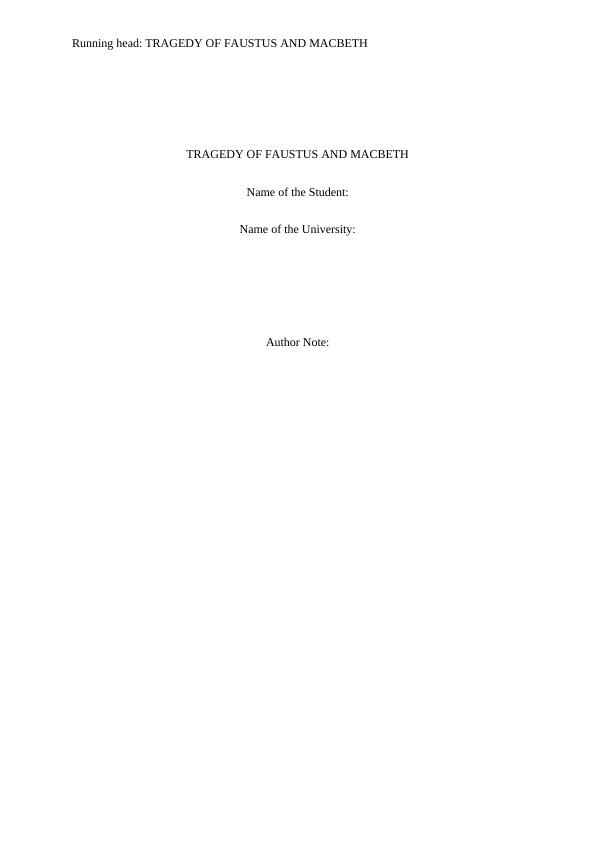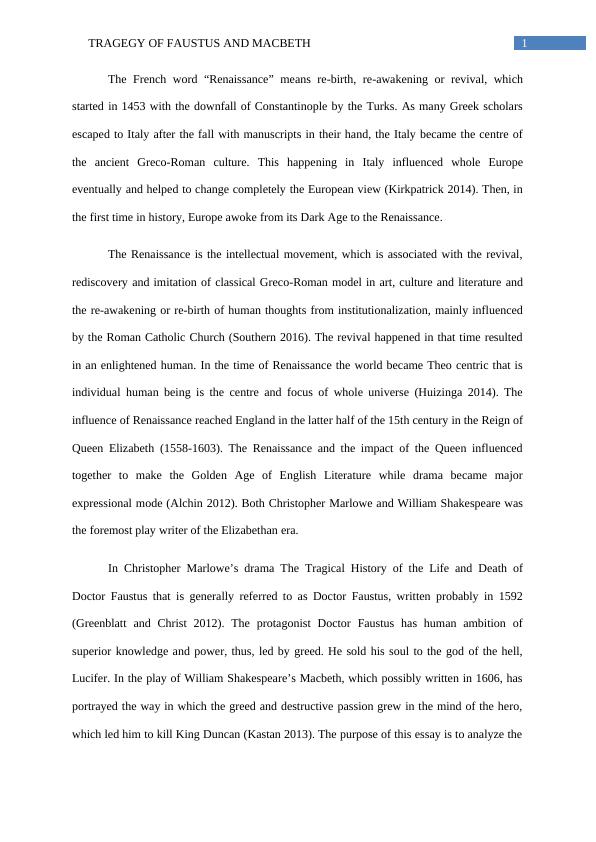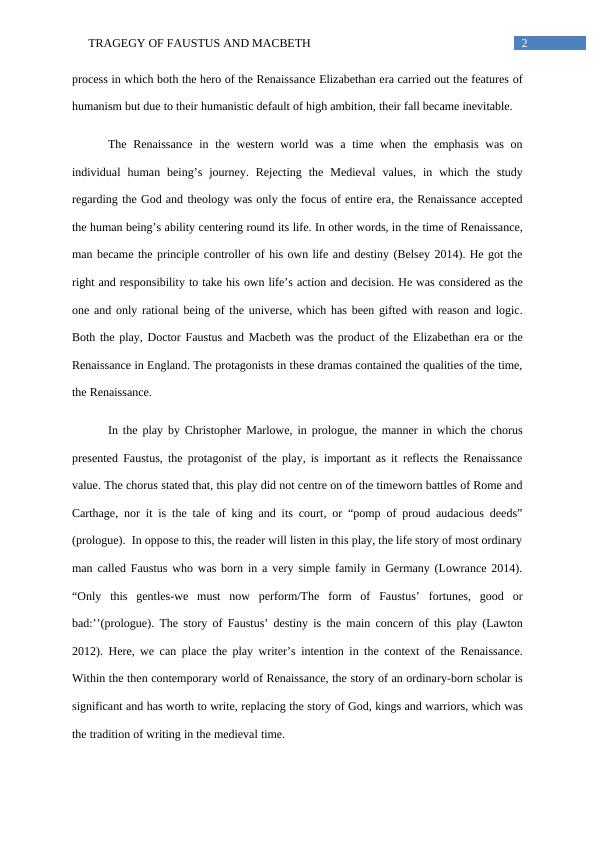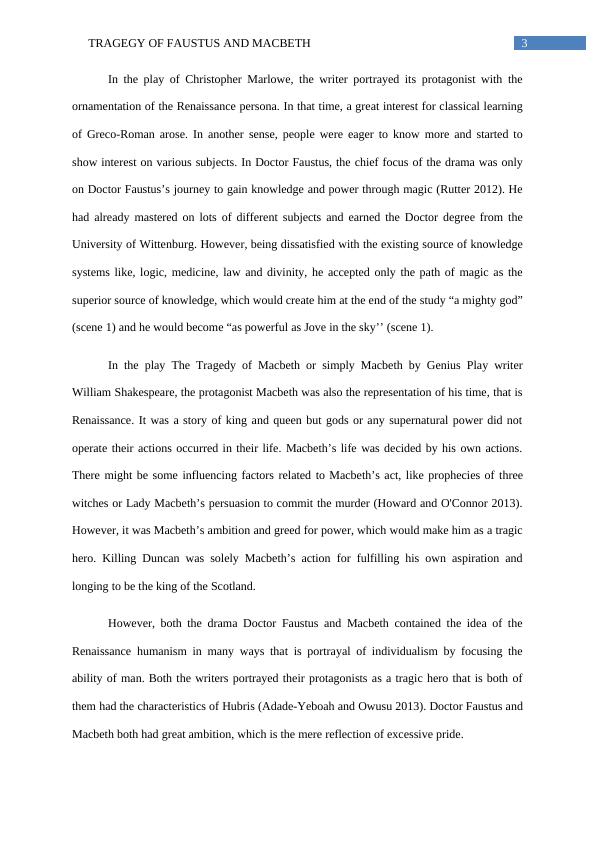Essay on Tragedy of Faustus and Macbeth for Renaissance
11 Pages3791 Words75 Views
Added on 2020-02-24
Essay on Tragedy of Faustus and Macbeth for Renaissance
Added on 2020-02-24
ShareRelated Documents
Running head: TRAGEDY OF FAUSTUS AND MACBETH
TRAGEDY OF FAUSTUS AND MACBETH
Name of the Student:
Name of the University:
Author Note:
TRAGEDY OF FAUSTUS AND MACBETH
Name of the Student:
Name of the University:
Author Note:

1TRAGEGY OF FAUSTUS AND MACBETH
The French word “Renaissance” means re-birth, re-awakening or revival, which
started in 1453 with the downfall of Constantinople by the Turks. As many Greek scholars
escaped to Italy after the fall with manuscripts in their hand, the Italy became the centre of
the ancient Greco-Roman culture. This happening in Italy influenced whole Europe
eventually and helped to change completely the European view (Kirkpatrick 2014). Then, in
the first time in history, Europe awoke from its Dark Age to the Renaissance.
The Renaissance is the intellectual movement, which is associated with the revival,
rediscovery and imitation of classical Greco-Roman model in art, culture and literature and
the re-awakening or re-birth of human thoughts from institutionalization, mainly influenced
by the Roman Catholic Church (Southern 2016). The revival happened in that time resulted
in an enlightened human. In the time of Renaissance the world became Theo centric that is
individual human being is the centre and focus of whole universe (Huizinga 2014). The
influence of Renaissance reached England in the latter half of the 15th century in the Reign of
Queen Elizabeth (1558-1603). The Renaissance and the impact of the Queen influenced
together to make the Golden Age of English Literature while drama became major
expressional mode (Alchin 2012). Both Christopher Marlowe and William Shakespeare was
the foremost play writer of the Elizabethan era.
In Christopher Marlowe’s drama The Tragical History of the Life and Death of
Doctor Faustus that is generally referred to as Doctor Faustus, written probably in 1592
(Greenblatt and Christ 2012). The protagonist Doctor Faustus has human ambition of
superior knowledge and power, thus, led by greed. He sold his soul to the god of the hell,
Lucifer. In the play of William Shakespeare’s Macbeth, which possibly written in 1606, has
portrayed the way in which the greed and destructive passion grew in the mind of the hero,
which led him to kill King Duncan (Kastan 2013). The purpose of this essay is to analyze the
The French word “Renaissance” means re-birth, re-awakening or revival, which
started in 1453 with the downfall of Constantinople by the Turks. As many Greek scholars
escaped to Italy after the fall with manuscripts in their hand, the Italy became the centre of
the ancient Greco-Roman culture. This happening in Italy influenced whole Europe
eventually and helped to change completely the European view (Kirkpatrick 2014). Then, in
the first time in history, Europe awoke from its Dark Age to the Renaissance.
The Renaissance is the intellectual movement, which is associated with the revival,
rediscovery and imitation of classical Greco-Roman model in art, culture and literature and
the re-awakening or re-birth of human thoughts from institutionalization, mainly influenced
by the Roman Catholic Church (Southern 2016). The revival happened in that time resulted
in an enlightened human. In the time of Renaissance the world became Theo centric that is
individual human being is the centre and focus of whole universe (Huizinga 2014). The
influence of Renaissance reached England in the latter half of the 15th century in the Reign of
Queen Elizabeth (1558-1603). The Renaissance and the impact of the Queen influenced
together to make the Golden Age of English Literature while drama became major
expressional mode (Alchin 2012). Both Christopher Marlowe and William Shakespeare was
the foremost play writer of the Elizabethan era.
In Christopher Marlowe’s drama The Tragical History of the Life and Death of
Doctor Faustus that is generally referred to as Doctor Faustus, written probably in 1592
(Greenblatt and Christ 2012). The protagonist Doctor Faustus has human ambition of
superior knowledge and power, thus, led by greed. He sold his soul to the god of the hell,
Lucifer. In the play of William Shakespeare’s Macbeth, which possibly written in 1606, has
portrayed the way in which the greed and destructive passion grew in the mind of the hero,
which led him to kill King Duncan (Kastan 2013). The purpose of this essay is to analyze the

2TRAGEGY OF FAUSTUS AND MACBETH
process in which both the hero of the Renaissance Elizabethan era carried out the features of
humanism but due to their humanistic default of high ambition, their fall became inevitable.
The Renaissance in the western world was a time when the emphasis was on
individual human being’s journey. Rejecting the Medieval values, in which the study
regarding the God and theology was only the focus of entire era, the Renaissance accepted
the human being’s ability centering round its life. In other words, in the time of Renaissance,
man became the principle controller of his own life and destiny (Belsey 2014). He got the
right and responsibility to take his own life’s action and decision. He was considered as the
one and only rational being of the universe, which has been gifted with reason and logic.
Both the play, Doctor Faustus and Macbeth was the product of the Elizabethan era or the
Renaissance in England. The protagonists in these dramas contained the qualities of the time,
the Renaissance.
In the play by Christopher Marlowe, in prologue, the manner in which the chorus
presented Faustus, the protagonist of the play, is important as it reflects the Renaissance
value. The chorus stated that, this play did not centre on of the timeworn battles of Rome and
Carthage, nor it is the tale of king and its court, or “pomp of proud audacious deeds”
(prologue). In oppose to this, the reader will listen in this play, the life story of most ordinary
man called Faustus who was born in a very simple family in Germany (Lowrance 2014).
“Only this gentles-we must now perform/The form of Faustus’ fortunes, good or
bad:’’(prologue). The story of Faustus’ destiny is the main concern of this play (Lawton
2012). Here, we can place the play writer’s intention in the context of the Renaissance.
Within the then contemporary world of Renaissance, the story of an ordinary-born scholar is
significant and has worth to write, replacing the story of God, kings and warriors, which was
the tradition of writing in the medieval time.
process in which both the hero of the Renaissance Elizabethan era carried out the features of
humanism but due to their humanistic default of high ambition, their fall became inevitable.
The Renaissance in the western world was a time when the emphasis was on
individual human being’s journey. Rejecting the Medieval values, in which the study
regarding the God and theology was only the focus of entire era, the Renaissance accepted
the human being’s ability centering round its life. In other words, in the time of Renaissance,
man became the principle controller of his own life and destiny (Belsey 2014). He got the
right and responsibility to take his own life’s action and decision. He was considered as the
one and only rational being of the universe, which has been gifted with reason and logic.
Both the play, Doctor Faustus and Macbeth was the product of the Elizabethan era or the
Renaissance in England. The protagonists in these dramas contained the qualities of the time,
the Renaissance.
In the play by Christopher Marlowe, in prologue, the manner in which the chorus
presented Faustus, the protagonist of the play, is important as it reflects the Renaissance
value. The chorus stated that, this play did not centre on of the timeworn battles of Rome and
Carthage, nor it is the tale of king and its court, or “pomp of proud audacious deeds”
(prologue). In oppose to this, the reader will listen in this play, the life story of most ordinary
man called Faustus who was born in a very simple family in Germany (Lowrance 2014).
“Only this gentles-we must now perform/The form of Faustus’ fortunes, good or
bad:’’(prologue). The story of Faustus’ destiny is the main concern of this play (Lawton
2012). Here, we can place the play writer’s intention in the context of the Renaissance.
Within the then contemporary world of Renaissance, the story of an ordinary-born scholar is
significant and has worth to write, replacing the story of God, kings and warriors, which was
the tradition of writing in the medieval time.

3TRAGEGY OF FAUSTUS AND MACBETH
In the play of Christopher Marlowe, the writer portrayed its protagonist with the
ornamentation of the Renaissance persona. In that time, a great interest for classical learning
of Greco-Roman arose. In another sense, people were eager to know more and started to
show interest on various subjects. In Doctor Faustus, the chief focus of the drama was only
on Doctor Faustus’s journey to gain knowledge and power through magic (Rutter 2012). He
had already mastered on lots of different subjects and earned the Doctor degree from the
University of Wittenburg. However, being dissatisfied with the existing source of knowledge
systems like, logic, medicine, law and divinity, he accepted only the path of magic as the
superior source of knowledge, which would create him at the end of the study “a mighty god”
(scene 1) and he would become “as powerful as Jove in the sky’’ (scene 1).
In the play The Tragedy of Macbeth or simply Macbeth by Genius Play writer
William Shakespeare, the protagonist Macbeth was also the representation of his time, that is
Renaissance. It was a story of king and queen but gods or any supernatural power did not
operate their actions occurred in their life. Macbeth’s life was decided by his own actions.
There might be some influencing factors related to Macbeth’s act, like prophecies of three
witches or Lady Macbeth’s persuasion to commit the murder (Howard and O'Connor 2013).
However, it was Macbeth’s ambition and greed for power, which would make him as a tragic
hero. Killing Duncan was solely Macbeth’s action for fulfilling his own aspiration and
longing to be the king of the Scotland.
However, both the drama Doctor Faustus and Macbeth contained the idea of the
Renaissance humanism in many ways that is portrayal of individualism by focusing the
ability of man. Both the writers portrayed their protagonists as a tragic hero that is both of
them had the characteristics of Hubris (Adade-Yeboah and Owusu 2013). Doctor Faustus and
Macbeth both had great ambition, which is the mere reflection of excessive pride.
In the play of Christopher Marlowe, the writer portrayed its protagonist with the
ornamentation of the Renaissance persona. In that time, a great interest for classical learning
of Greco-Roman arose. In another sense, people were eager to know more and started to
show interest on various subjects. In Doctor Faustus, the chief focus of the drama was only
on Doctor Faustus’s journey to gain knowledge and power through magic (Rutter 2012). He
had already mastered on lots of different subjects and earned the Doctor degree from the
University of Wittenburg. However, being dissatisfied with the existing source of knowledge
systems like, logic, medicine, law and divinity, he accepted only the path of magic as the
superior source of knowledge, which would create him at the end of the study “a mighty god”
(scene 1) and he would become “as powerful as Jove in the sky’’ (scene 1).
In the play The Tragedy of Macbeth or simply Macbeth by Genius Play writer
William Shakespeare, the protagonist Macbeth was also the representation of his time, that is
Renaissance. It was a story of king and queen but gods or any supernatural power did not
operate their actions occurred in their life. Macbeth’s life was decided by his own actions.
There might be some influencing factors related to Macbeth’s act, like prophecies of three
witches or Lady Macbeth’s persuasion to commit the murder (Howard and O'Connor 2013).
However, it was Macbeth’s ambition and greed for power, which would make him as a tragic
hero. Killing Duncan was solely Macbeth’s action for fulfilling his own aspiration and
longing to be the king of the Scotland.
However, both the drama Doctor Faustus and Macbeth contained the idea of the
Renaissance humanism in many ways that is portrayal of individualism by focusing the
ability of man. Both the writers portrayed their protagonists as a tragic hero that is both of
them had the characteristics of Hubris (Adade-Yeboah and Owusu 2013). Doctor Faustus and
Macbeth both had great ambition, which is the mere reflection of excessive pride.

End of preview
Want to access all the pages? Upload your documents or become a member.
